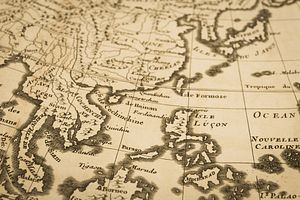In a service to all South China Sea watchers, the Permanent Court of Arbitration (PCA) announced that its award in Philippines v. China will be announced on July 12. For the outgoing Aquino administration in the Philippines–the initiator of the arbitration–the award will come a little too late. But, for Rodrigo Duterte, the Philippines’ new president, who’s sent mixed signals on how he views the South China Sea, the PCA’s verdict will offer an immense foreign policy challenge. How Duterte steers the Philippines in the aftermath of the verdict, which is expected to widely go in Manila’s favor on most questions, will have immense importance.
The mid-July announcement will also bear on the Association of Southeast Asian Nations, which, as my colleague Prashanth Parameswarn has detailed over several reports, has proven unable to sustain consensus on the South China Sea disputes in the face of Chinese pressure. (See Prashanth’s reports here and here.) The Duterte administration will not only need to be prepared for China’s criticism of the PCA’s decision, but it will also need to take the initiative in ensuring that ASEAN pulls together after the embarrassing failure to proffer a consensus-based statement on the South China Sea at the recent special foreign ministers meeting near Kunming, China. (Readers may be interested in a recent podcast where Prashanth and I talk over the extent to which ASEAN consensus existed at Kunming.)
The July 12 timing of the verdict will give the Duterte administration and the nine other ASEAN governments to prepare for the upcoming 49th ASEAN Foreign Ministers Meeting in Vientiane, Laos. Laos, the current ASEAN chair, has proven to be willing to acquiesce to Chinese pressure. Regional analysts fear a repeat of ASEAN’s disappointing 2012 summit in Cambodia, when the Cambodian government scuttled the issuance of a joint ASEAN statement after consultations in Phnom Penh (a first in ASEAN history). At the time, the Cambodian government–close to China and without a particular stake in the South China Sea disputes–wasn’t on board with the Philippines’ insistence that the 2012 stand-off with China over Scarborough Shoal be fully reflected in the statement. Unable to overcome the impasse, ASEAN issued no statement.
ASEAN unity is no doubt in an uncomfortable place this summer after the Yuxi meeting. Even though consensus was forged between ASEAN foreign ministers before the issuance of the promptly retracted “media statement” by Malaysia, China’s interference and outreach to the Cambodian and Lao delegations exposed fissures within ASEAN. Four ASEAN states (the Philippines, Malaysia, Brunei, and Vietnam) are territorial claimants in the South China Sea; two (Indonesia and Singapore) are increasingly interested parties in the disputes; Cambodia and Laos are notably close to China.
Despite the asymmetric stakes over the South China Sea, ASEAN, to sustain its centrality and put up a joint front in support of international law, must stand unified after the PCA announces its award. China, no doubt, has been closely in touch with the Lao and Cambodian governments ahead of the award. (Recently, comments by Cambodian Prime Minister Hun Sen suggested that Cambodia had come around fully to the Chinese position–a suggestion the Cambodian foreign ministry quickly stepped in to deny.)
One source of concern that ASEAN may choose to treat the award with less seriousness than is necessary is Rodrigo Duterte’s repeated insinuations that the South China Sea may become a smaller ticket foreign policy issue for his government than Aquino’s. In 2012, it was Philippine Secretary of Foreign Affairs Albert Del Rosario’s energetic insistence on mentioning the Scarborough stand-off that led to the collapse of the joint statement. Pefecto Yasay Jr., the Duterte government’s incoming foreign secretary, has insinuated that the Philippines should be open to addressing the South China Sea issue bilaterally with China. (Bilateral negotiations among concerned parties happens to be China’s preferred mode of diplomacy, leaving international law aside.)
The merits of the PCA’s ruling will matter immensely for the future of the geopolitics surrounding the South China Sea disputes, but equally important will be the reaction of regional states and ASEAN, the paramount the regional organization. The gold standard for ASEAN would be a strong statement voicing full-throated support for the legitimacy of the PCA’s ruling, in addition to a repeat of the particularly strong language on the South China Sea presented at the Sunnylands, California summit. When the foreign ministers convene in Laos, nine days after the PCA verdict is released, what will they be able to say?

































